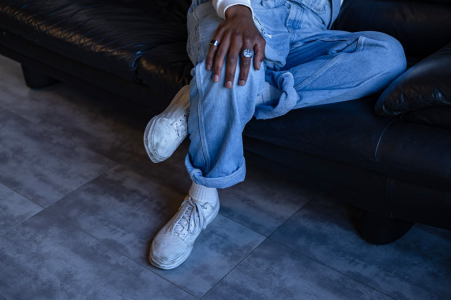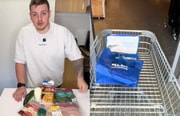Think your home is clean? One common habit could be putting your family at risk
By
Maan
- Replies 0
A common home habit might be exposing your family to deadly bacteria—and most people don’t think twice about it.
A top GP has warned this everyday mistake could bring harmful pathogens, chemicals, and allergens into your house.
And if you’ve got young kids or pets, the risk might be even greater than you realise.
Dr Amir Khan, an NHS GP, urged the public to rethink one seemingly innocent habit: wearing shoes indoors.
In a video shared on social media that attracted over 125,300 views, Dr Khan said: ‘If you are anything like me you take off your shoes as soon as you get into the house.
‘It's a sign of respect if you are in someone else's house, but also it can reduce the risk of bugs and chemicals being traced around your home.’
While he acknowledged that ‘not all dirt is bad’, he warned that what clings to your soles can be far more dangerous than a bit of mud.
‘Shoes can harbour a lot of bacteria,’ he explained, noting that animal waste, including urine and faeces, often coats outdoor surfaces.
‘So, things like E.coli which have been linked to stomach infections and urinary tract infections can be brought in through our shoes.’
E.coli is one of the UK’s leading causes of bloodstream and urinary tract infections, which can become life-threatening in vulnerable individuals.
The GP also noted that shoes can carry in ‘pollen, dust and mould’—all of which can trigger allergic reactions, asthma, or hay fever symptoms.
He added: ‘If you've been walking in parks (or) old golf courses, there could be lots of pesticide chemicals on your shoes too.
‘Now, in small doses they are not harmful at all, but you don't want them in your house where you are going to be preparing food.
‘So, take your shoes off, leave your cat, and put some in door slippers on,’ he said, as his cat playfully batted at his shoelaces.
Source: Tiktok/doctoramirkhann
Many people agreed in the video’s comment section, with one writing: ‘I hate it when people just walk in with shoes all over my carpet.’
Another added: ‘Always and make other people take their shoes off as they enter my home.’
A third user commented: ‘No one gets in my house with shoes on. I have an off-white carpet right through the house.’
The warning came as new figures showed an alarming spike in serious E.coli infections in the UK.
Data from the UK Health Security Agency (UKHSA) revealed 2,063 confirmed cases of Shiga toxin-producing E.coli (STEC) in 2022—up from 1,151 in 2021.
STEC is a highly dangerous strain linked to kidney failure, severe blood clotting disorders, and even colon cancer.
Young children under five were found to be most at risk due to their developing immune systems and more vulnerable kidneys.
Outbreaks were traced to contaminated beef, salad leaves, and dairy products.
The concerns were echoed in a separate warning about artificial grass potentially harbouring dangerous bacteria during hot weather.
Commissioned by Decking Superstore, the report noted: ‘Artificial grass can trap pet urine and faecal bacteria, if not rinsed and sanitised.’
It added: ‘Pet urine doesn't soak into the ground like it would with natural grass—instead it lingers on the surface or underneath, especially if left untreated.’
This lingering waste can release harmful vapours and increase the spread of bacteria such as E.coli and salmonella.
In fact, UK salmonella cases surged by nearly a fifth in 2024, hitting over 10,000 infections—the highest figure in a decade.
Only 8,000 cases were recorded in 2015 by comparison.
In response, health officials reminded households and food businesses to maintain strict hygiene, especially when handling raw meat or fresh produce.
Food safety tips included properly chilling and cooking food, cleaning prep surfaces and chopping boards, and avoiding cross-contamination.
As salmonella often spreads through undercooked or raw meats, following package instructions on time and temperature was also strongly advised.
If you thought the bacteria hiding on your shoes were bad, just wait until you hear what might be lurking in your pocket.
Mobile phones, used daily and rarely cleaned, can carry even more germs than a toilet seat—including dangerous strains like E.coli.
This eye-opening story reveals the dirty truth behind one of the most overlooked hygiene habits.
Read more: Cleanliness calling: The shocking item Aussies never clean that's hiding more germs than your toilet!

Is the comfort of wearing shoes indoors worth the invisible risks you might be tracking through your home?
A top GP has warned this everyday mistake could bring harmful pathogens, chemicals, and allergens into your house.
And if you’ve got young kids or pets, the risk might be even greater than you realise.
Dr Amir Khan, an NHS GP, urged the public to rethink one seemingly innocent habit: wearing shoes indoors.
In a video shared on social media that attracted over 125,300 views, Dr Khan said: ‘If you are anything like me you take off your shoes as soon as you get into the house.
‘It's a sign of respect if you are in someone else's house, but also it can reduce the risk of bugs and chemicals being traced around your home.’
While he acknowledged that ‘not all dirt is bad’, he warned that what clings to your soles can be far more dangerous than a bit of mud.
‘Shoes can harbour a lot of bacteria,’ he explained, noting that animal waste, including urine and faeces, often coats outdoor surfaces.
‘So, things like E.coli which have been linked to stomach infections and urinary tract infections can be brought in through our shoes.’
E.coli is one of the UK’s leading causes of bloodstream and urinary tract infections, which can become life-threatening in vulnerable individuals.
The GP also noted that shoes can carry in ‘pollen, dust and mould’—all of which can trigger allergic reactions, asthma, or hay fever symptoms.
He added: ‘If you've been walking in parks (or) old golf courses, there could be lots of pesticide chemicals on your shoes too.
‘Now, in small doses they are not harmful at all, but you don't want them in your house where you are going to be preparing food.
‘So, take your shoes off, leave your cat, and put some in door slippers on,’ he said, as his cat playfully batted at his shoelaces.
Source: Tiktok/doctoramirkhann
Many people agreed in the video’s comment section, with one writing: ‘I hate it when people just walk in with shoes all over my carpet.’
Another added: ‘Always and make other people take their shoes off as they enter my home.’
A third user commented: ‘No one gets in my house with shoes on. I have an off-white carpet right through the house.’
The warning came as new figures showed an alarming spike in serious E.coli infections in the UK.
Data from the UK Health Security Agency (UKHSA) revealed 2,063 confirmed cases of Shiga toxin-producing E.coli (STEC) in 2022—up from 1,151 in 2021.
STEC is a highly dangerous strain linked to kidney failure, severe blood clotting disorders, and even colon cancer.
Young children under five were found to be most at risk due to their developing immune systems and more vulnerable kidneys.
Outbreaks were traced to contaminated beef, salad leaves, and dairy products.
The concerns were echoed in a separate warning about artificial grass potentially harbouring dangerous bacteria during hot weather.
Commissioned by Decking Superstore, the report noted: ‘Artificial grass can trap pet urine and faecal bacteria, if not rinsed and sanitised.’
It added: ‘Pet urine doesn't soak into the ground like it would with natural grass—instead it lingers on the surface or underneath, especially if left untreated.’
This lingering waste can release harmful vapours and increase the spread of bacteria such as E.coli and salmonella.
In fact, UK salmonella cases surged by nearly a fifth in 2024, hitting over 10,000 infections—the highest figure in a decade.
Only 8,000 cases were recorded in 2015 by comparison.
In response, health officials reminded households and food businesses to maintain strict hygiene, especially when handling raw meat or fresh produce.
Food safety tips included properly chilling and cooking food, cleaning prep surfaces and chopping boards, and avoiding cross-contamination.
As salmonella often spreads through undercooked or raw meats, following package instructions on time and temperature was also strongly advised.
If you thought the bacteria hiding on your shoes were bad, just wait until you hear what might be lurking in your pocket.
Mobile phones, used daily and rarely cleaned, can carry even more germs than a toilet seat—including dangerous strains like E.coli.
This eye-opening story reveals the dirty truth behind one of the most overlooked hygiene habits.
Read more: Cleanliness calling: The shocking item Aussies never clean that's hiding more germs than your toilet!
Key Takeaways
- Wearing shoes indoors could expose your household to E.coli and harmful chemicals.
- E.coli is a major cause of serious infections in the UK, especially among young children.
- Artificial grass can trap faecal bacteria and become hazardous in hot weather.
- Food safety measures remain critical as salmonella infections continue to rise.
Is the comfort of wearing shoes indoors worth the invisible risks you might be tracking through your home?








